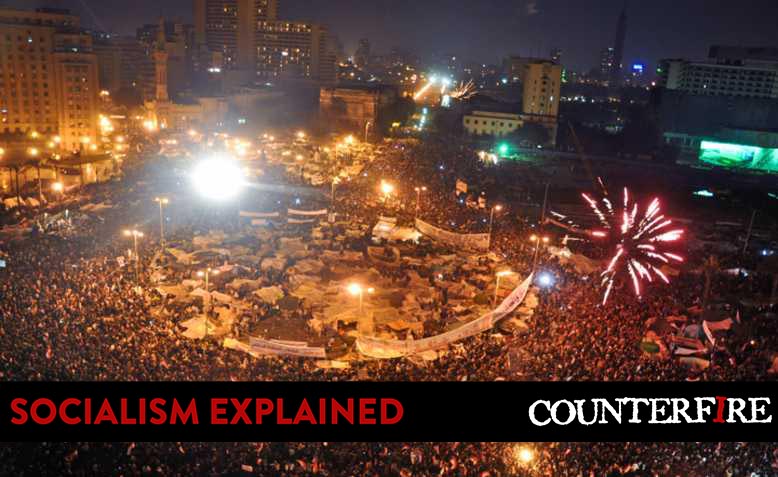 Tahrir Square celebrations after Mubarak's resignation. Photo: Jonathan Rashad / Wikimedia Commons / CC BY 2.0, licence linked at bottom of article
Tahrir Square celebrations after Mubarak's resignation. Photo: Jonathan Rashad / Wikimedia Commons / CC BY 2.0, licence linked at bottom of article
Katherine Connelly looks at the continuing possibility of revolution for transforming society today
Counterfire’s Socialist Explainers series
Yes. We know this is true because there have been revolutions in the twenty-first century, for example the revolutions of the ‘Arab Spring’ in 2011 that overthrew dictatorships in Tunisia and Egypt.
The assumption behind this question is that the nineteenth-century world the famous revolutionary Karl Marx knew, of smoky factories where large groups of workers produce commodities, has been replaced by “tech” and a service sector economy – at this point someone usually mentions that some people even get to play ping pong or sit on beanbags at work! And, therefore, Marxist ideas are no longer relevant. This argument is very superficial.
It doesn’t really describe the world of work today. When Marx was writing, the working-class was only a tiny proportion of the world’s population – even in a capitalist country like France the majority of the population were peasants living in the countryside. Now the working-class is global and big multinational companies (maybe even with beanbags in their offices) run sweatshops across the global South. In Britain and the US, as the Covid-19 pandemic has exposed, working people still work together in large numbers – think of the outbreaks in meat packing factories and indeed Amazon warehouses.
That the nature of much work has changed is nevertheless undoubtedly true, but this would have been the least surprising aspect of capitalism to Marx, who identified that it was an essentially and uniquely revolutionary economic system. It cannot be static, it needs to constantly find new markets, to “increase productivity” (meaning profits), to reduce “costs” (meaning our wages), and find new technological innovations to drive other capitalists out of the market and grab more for themselves.
Such innovations make capitalism a hugely productive system. This means that no one need go without a home, or healthcare, or food. But because capitalism is organised around profit and not human need, hundreds of millions of people do. For all its productive capacity, capitalism is also an essentially destructive system: wars and climate change are two devastating symptoms.
So, not only is there a need for a revolution in the twenty-first century in order to reorganise society to meet human needs, capitalism has also created the possibility for those needs to be met.
Capitalism is inherently unstable because it cannot get away from the contradiction at its heart: that it relies on the exploitation of the vast majority of people (workers) who are not paid the value of what they produce. Instead, a proportion is expropriated as profits before we even see our wage slip. This mechanism, essential to the survival of capitalism, is reliant upon the work of those who have no interest in perpetuating this system.
Although the establishment invest a lot of effort to make us feel disempowered and atomised there are times when people overwhelmingly reject reactionary ideas. Even before the Covid-19 crisis, there were a series of insurgent, mass struggles across the globe: in Iraq, Sudan, Lebanon, Algeria, Colombia, Chile and Ecuador.
Today, with a huge public health crisis intensified by the relentless drive for profit and in the face of an imminent severe economic crisis people are taking to the streets and organising to demand a different kind of society. In these circumstances, revolutionary change looks more, not less, likely.
Revolutions have happened and will happen in the twenty-first century. The key question is whether they can be successful. That depends how well organised we are and upon the strength of socialist ideas that show how another world, organised by and for human beings, can be won.
Join Revolution! May Day weekender in London
The world is changing fast. From tariffs and trade wars to the continuing genocide in Gaza to Starmer’s austerity 2.0.
Revolution! on Saturday 3 – Sunday 4 May brings together leading activists and authors to discuss the key questions of the moment and chart a strategy for the left.

